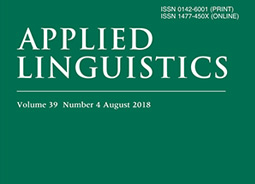
Methodological applications of membership categorization analysis for social class research
Josephine Lee (leejosephine@ewha.ac.kr)
Department of English Education

Discussions of social class are increasingly becoming widespread in applied linguistics and language education research. Yet, social class remains an undertheorized construct, and especially its methodological treatment deserves empirical attention. This article thereby attempts to critically examine the current definitions and approaches to social class by reviewing the theoretical conceptualizations and methodological issues in applied linguistics research. This article, then, proposes Membership Categorization Analysis (MCA) as a profitable, emic method for analyzing class in terms of participants' own local categories and practical orientations rather than taking it for granted as a predetermined label or identity.
While previous class-based studies have contributed to our understanding of social class and language learning, one common weakness is that the data often obscures the participants' lived experiences and social categories in favor of an abstract and analyst-driven description of social class. These studies adopt labels derived from questionnaire-based sociological work that readily categorize a participant as a 'middle class' or 'upper class' based on general indicators such as income, occupation, and educational levels. However, social class cannot be operationalized as a rigid, stable variable, and inequality is much more than a statistical difference. Moreover, preconceived categories of social class, no matter how many are considered, are the analyst's categories and not the participants'. An analysis that relies on a few pregiven categories is reductionist, and most importantly, it also fails to capture the lived reality of the participants in terms of local descriptions and categories that are their own.
Along this line, MCA can be a powerful tool for analyzing the production of identities and social relationships, because it draws attention to how members of a society generate various categories to describe people in their talk and make sense of particular events. In MCA, emphasis is placed on how membership categories are assembled in situ as a participants' resource in achieving identities, realities, and social order. Such a conceptualization shifts focus away from macro-abstraction and instead enables the researcher to gain access to how members arrange common sense knowledge, versions of social reality, and moral assumptions in their talk, actions, and interactional practices.
To illustrate the usefulness of MCA, this article shows sample analyses of interview excerpts wherein two mothers are discussing an English immersion policy proposal in South Korea. In this sample MCA analysis, two Korean mothers, through categorization work, produce their stances towards the English immersion policy proposal. Both participants project a disfavoring stance towards the policy, and they set forward accusing remarks against the president for making 'insane' decisions and 'neglecting' children. In doing so, they recognize that different categories of children have unequal category-bound abilities, and their pervasive use of categories serve as explications and confirmations of the stereotypical image of inequality in education. Under the influences of the policy, they both see a dichotomized division in the students, and central to their accounts is the differential nature between the categories of 'the city' and 'the isolated rest,' 'private school' and 'non-private school' students, as well as children with and without opportunities.' These particulars have the power of evoking a social world in which activities and privileges are clearly divided according to social, educational, and locational memberships. Here, social class is made relevant by the participants themselves, rather than the researcher, as the different categories and their resulting inequality become an achievement and a resource for projecting the particpants' negative assessment towards the policy proposal.
This article argues that in social class research, the data should be approached with sensitivity to the categories that are demonstrably relevant as class to the participants. If class really matters, how it matters and to whom it matters needs to be answered by means of rigorous attention to the data. In other words, it is not just the external factors such as recruitment criteria, occupation, or participants that determine the participants as members of an underprivileged or privileged social class. It is the participants themselves that observably prove such categories as being relevant to their practical reasoning and concerns. By viewing class as an interpretive, categorial work in action, MCA provides readers with an analysis that is accountable to the data, powerfully substantiating the participants’ endogenous understandings of class, social structure, and stratification. The analysis provides a foundation, then, for discovering the political uses to which social class categories can be put, and for drawing the political implications that are most relevant to our participants' interests. In this respect, MCA can be a powerful methodological tool can bolster the persuasiveness and credibility of social class research by providing a stronger empirical grounding for its analysis, leading into further contribution to studies on social justice and inequality.
* Related article/book
Josephine Lee, Methodological applications of membership categorization analysis for social class research, Applied Linguistics, 39(4), 532–554, 2018
Block, David., 2014, Social Class in Applied Linguistics, Routledge

